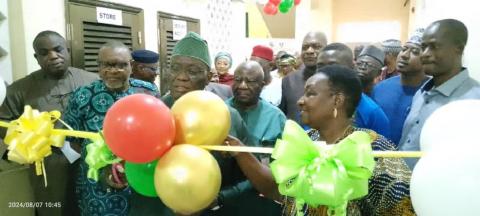
The Vice-Chancellor, National Open University of Nigeria (NOUN), Prof. Olufemi Peters, has commissioned newly-established laboratories of the Africa Centre of Excellence on Technology Enhanced Learning (ACETEL) as part of the centre’s continuous effort to enhance academic and research capabilities of the university.
The ground-breaking event took place on Wednesday, August 7, 2024 at the NOUN headquarters in Abuja.
Laboratories commissioned were the Management Information Systems (MIS) Laboratory, Cybersecurity Laboratory, Virtual Reality Laboratory, ACETEL Basic Laboratory, Artificial Intelligence Laboratory, ACETEL – CISCO Academy and the Multimedia Laboratory.
In his remarks, the Vice-Chancellor appreciated the World Bank for the establishment of ACETEL in NOUN and commended the centre for the effort it is putting toward fulfilling its mandate, noting that the MSc and PhD programmes of the centre are peculiar.
While noting that the university is closely watching the activities of ACETEL, he said the centre “is a postgraduate facility for the progressives,” and urged the leadership of ACETEL to collaborate with the faculties of the university.
After the commissioning ceremony, the VC toured the seven laboratories, inspecting the equipment and gadgets being operated by ACETEL staff in charge of the labs and its students, showcasing the use of the labs and the systems.
Earlier, the ACETEL Director, Prof. Grace Jokthan, gave a brief history of the centre, stating that ACETEL was established in 2019 as a response of the university to the call by the World Bank on the ACE Impact Project Submission.
Speaking further, she said “Despite the launch of the centre, it actually fully became operational in January 2021, this was as a result of COVID-19 and also issues relating to funding by the Nigerian government to sign the agreement.
“Through this comprehensive suite of programmes ACETEL is running, which are six programmes at the MSc and PhD levels in Management Information Systems (MIS), CyberSecurity and Artificial Intelligence, ACETEL is poised to deliver its mandate in shaping and to be at the forefront as Africa’s digital education future.”
She explained that “There are input from the two regional bodies, as well as NUC, there are input from NUC, there are input from the university, there are input from facilitators, there are input from industry, there are input from students as well as the ACETEL team. This inputs are running the activities of the centre which involve the use of IT for training, for education as well as for delivery for research output for the centre and the region as a whole.”
Jokthan added that “The academic programmes are there; they have been resource verified and accredited by NUC. We have also gotten to a level in the institutional accreditation due to the existence of these programmes and we are currently submitting for international programme accreditation for the six programmes.
The centre, according to her, has 256 students out of which 47 are regional students, while 35 are females.
The state of the art laboratories were designed to support cutting-edge research and advanced learning opportunities for students and faculties, she said.

